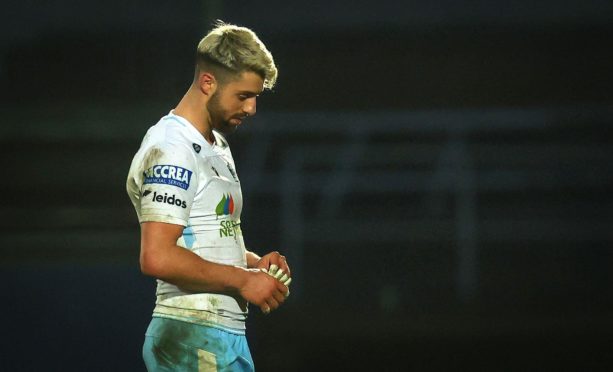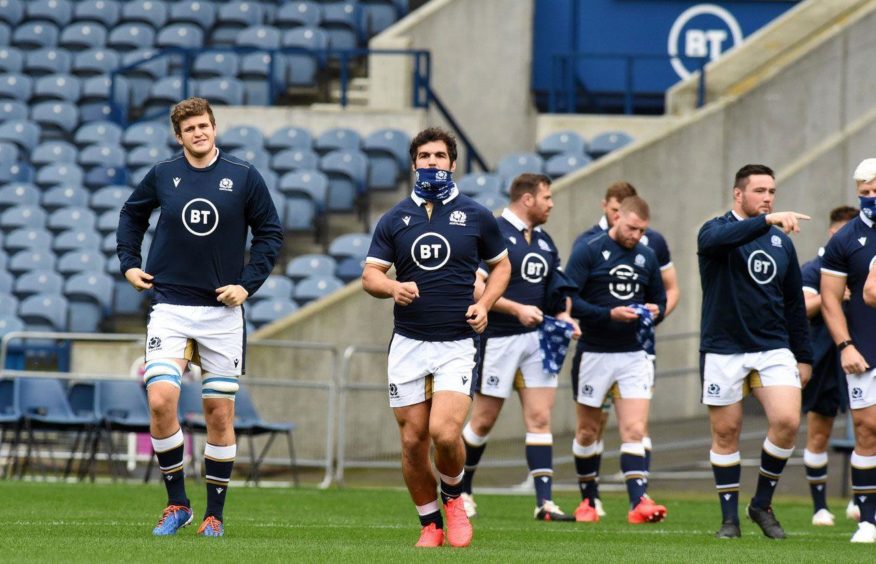The Rainbow Cup – let’s face it, it sounds like a toddler’s juice mug – is here, but under a large cloud.
On Wednesday it was finally confirmed what’s been rumoured for weeks. The element that was the competition’s entire raison d’etre – games matching the PRO14 sides and the major South African franchises formerly of Super Rugby – isn’t happening.
The Bulls, Lions, Sharks and Stormers aren’t being allowed in to play games in Europe, due to South Africa’s Covid-19 variant. India’s more virulent variant was apparently okay for borders to stay open with the UK until Monday, but “abundance of caution” and all that.
Anyway the PRO14 partners are pressing on, playing games between the usual suspects. There are broadcast partners to be assuaged, and maybe a Mothercare sponsorship deal is being finalised.
The Scottish interest is two more games between Edinburgh and Glasgow; Edinburgh hanselling in the new ground that simply must not, in any circumstances, be called Mini-Murrayfield; and the piecing together of whoever is still standing.
Finishing up the 1872 Cup for this miserable season for the pro teams seems reasonable. But I’m totally scunnered for the players, who surely deserve some kind of respite after a season like no other.
Rugby should be grateful for players’ sacrifices during the pandemic
Rugby has had full value out of the young men who play the professional game these last nine months. More than that, actually, it’s had a massive bargain.
Like many in other walks of life, professional rugby players in Scotland took a wage cut during the pandemic. Finances were strained by a complete shutdown of the sport and the loss of revenues from closed door games.
Scottish Rugby probably expected £30 million worth of income from the six tests it had scheduled for Murrayfield this season. Some TV rights and advertising money was salvaged. The union got governmental grants and a loan, and the lucrative CVC equity deal with the Six Nations was confirmed, but it’s still a big hole.
TV demands meant more games
TV rights was the sole source of revenue for a while, and therefore games have come thick and fast during the pandemic. The Autumn Nations Cup added two more internationals, while the new schedule required games on Friday, Saturday, Sunday and even Monday nights.
Scotland’s three matches in 12 days schedule – two six-day turnarounds in a row – at the end of the Six Nations was well outside what’s usually advised for player safety.
Add to this what players have been through simply to play. They’ve first been isolated, then training in part-isolation, then in bio-bubbles to protect them against infection.
During the Autumn Nations and the Six Nations, squads went into closed quarantine for weeks on end, separated from partners and families.
Or they endured the difficulties of pandemic travel as they flitted between international camp and their clubs in England and France, where there seemed to be absolutely no end to the relentless schedule. The mental strain must have been considerable.
They played much more for less
To their credit, there has been very little (public) grousing or complaint from the players. The standard reference we heard was gratitude at “the privilege of continuing to do the job we love”.
Many players said that they felt the obligation to help the game by playing more for less in these exceptional circumstances.
Injuries can happen at any time in rugby, but this season we’ve seen more wear and tear than is normal. Scotland’s two frontline hookers, Stuart McInally and Fraser Brown, missed the entire Six Nations.
The previously indestructible Jonny Gray missed time, and so did his back-up Ben Toolis. Adam Hastings, Scott Cummings, Darcy Graham, Rory Sutherland and Huw Jones are already out for what remains of this season.
Ahead lies some Scotland tests this summer, and hopefully for some the Lions Tour. And this Rainbow Cup.
A chance missed in exceptional circumstances
Am I alone in thinking that this is overkill and potentially damaging? The players fronted up when exceptional circumstances required them to during this season, but it has to work both ways.
Now we’re winding up the season with nothing to play for. There was an ideal opportunity to give some reward for the players’ efforts and sacrifices by letting them have some badly-needed rest and recovery time.
But we plough on, rather pointlessly. Let’s all hope that it doesn’t result in serious damage further down the line.
But while we’re here, why not?
Another slightly interesting aspect of the Rainbow Cup is the trialling of three law variations.
A goal-line dropout will now occur after attackers are held-up or knock on over the line, or if defenders ground the ball in-goal. The sanction for a red card is now just 20 minutes, although the miscreant must be replaced at the end of that time.
Finally, there’s one captain’s challenge a game, on try-scoring incidents, foul play and anything in the last five minutes.
Predictably, there’s been a storm of derision from some traditionalists. But if we want a proper trial of new laws – and we should – a competition featuring top teams is going to get better results than student rugby, which is the usual way rugby does this.
I like the goal-line drop-out idea, and am highly doubtful about the other two. But seeing them all in play at this level, we’ll know for sure.


